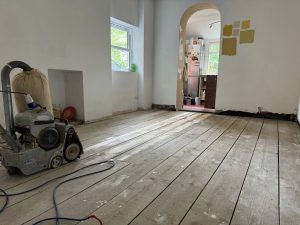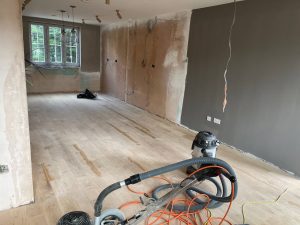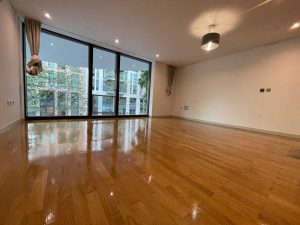
As environmental awareness continues to grow, many homeowners in London are seeking ways to make their home improvements more eco-friendly. Floor sanding is no exception. By adopting sustainable practices, you can restore your wooden floors while minimizing your environmental impact. Here’s a guide to eco-friendly floor sanding practices that will help you achieve beautiful, long-lasting results with a conscience.
- Choosing Eco-Friendly Materials
Low-VOC Finishes:
- Opt for finishes that are low in volatile organic compounds (VOCs). These finishes release fewer harmful chemicals into the air, improving indoor air quality and reducing your environmental footprint.
Water-Based Products:
- Water-based polyurethane and stains are less toxic and emit fewer fumes compared to their oil-based counterparts. They provide a durable finish while being safer for both you and the environment.
Sustainable Wood Sources:
- Ensure that any wood used for repairs or replacements is sourced sustainably. Look for certifications from organisations like the Forest Stewardship Council (FSC), which guarantees that the wood comes from responsibly managed forests.
- Using Energy-Efficient Equipment
Modern Sanding Machines:
- Use or hire companies that utilise the latest sanding equipment. Modern machines are more energy-efficient and often come with advanced dust collection systems that reduce dust and debris, making the process cleaner and healthier.
Dust Collection Systems:
- Effective dust collection systems not only protect your indoor air quality but also reduce the amount of waste generated. These systems capture dust at the source, preventing it from spreading throughout your home.
- Proper Waste Management
Recycling Sawdust:
- Sawdust generated from floor sanding can be repurposed in several ways, such as composting or using it for small craft projects. Properly managing this byproduct can reduce waste and make your sanding project more sustainable.
Disposing of Old Finishes:
- Ensure that any old finishes removed from your floors are disposed of correctly. Many finishes contain chemicals that should not be thrown away with regular waste. Check with your local council for hazardous waste disposal guidelines.
- Minimising Energy Use
Efficient Scheduling:
- Plan your floor sanding project to make the most efficient use of time and resources. Grouping tasks together can reduce the overall energy consumption of the equipment used.
Natural Drying Methods:
- Where possible, allow finishes to dry naturally rather than using fans or other drying aids. This reduces energy use and can often lead to a better finish.
- Hiring Eco-Conscious Professionals
Research and Vetting:
- Choose a floor sanding service that prioritises eco-friendly practices. Ask potential contractors about their sustainability policies and the products they use. A reputable service will be transparent about their commitment to the environment.
Local Services:
- Hiring local professionals reduces transportation emissions and supports the local economy. Local contractors are also more likely to understand the specific environmental regulations and best practices for your area.
- Maintenance and Longevity
Regular Care:
- Properly maintaining your newly sanded floors can extend their lifespan, reducing the need for future sanding and refinishing. Regular sweeping, mopping with eco-friendly cleaners, and using protective mats can help keep your floors in top condition.
Education:
- Educate yourself on the best practices for floor care. Understanding how to treat spills, scratches, and other common issues promptly and correctly can prevent long-term damage and the need for more intensive repairs.
Conclusion
Eco-friendly floor sanding is an excellent way to enhance the beauty of your home while staying committed to sustainable practices. By choosing low-VOC finishes, using energy-efficient equipment, properly managing waste, and hiring eco-conscious professionals, you can achieve stunning results that are kind to the environment.
As a London homeowner, embracing these practices not only contributes to a healthier home but also supports broader efforts to protect our planet. Make your next floor sanding project a green one and enjoy the benefits of a beautiful, sustainable home.







Floor sanding and renovation and installation services in Kingston
**Kingston: A Vibrant Historic City** Kingston is a vibrant and historic town located along the[Read more...]
Floor sanding and renovation and installation services in Lewisham
**Lewisham: A Thriving South London Community** Lewisham is a diverse and dynamic area in southeast[Read more...]
Floor Sanding for Stairs: Techniques and Tips
Floor Sanding for Stairs: Techniques and Tips Enhance the beauty and longevity[Read more...]
How to Plan a Floor Sanding Project for Large Spaces
How to Plan a Floor Sanding Project for Large Spaces Planning a floor sanding[Read more...]
Why Floor Sanding is Essential for London Homes
Introduction Floor sanding is a crucial maintenance task for homeowners in London. It goes beyond[Read more...]
Choosing the Right Floor Sanding Service in London
When it comes to revitalising your wooden floors, selecting the right floor sanding service is[Read more...]
floorboard replacement
[Read more...]
Floor sanding and renovation and installation services in Harlow
Harlow, located in Essex, is a thriving town with a rich history and a strong[Read more...]
Sep
How Surface Textures Impact Warmth and Comfort: Insights for Your London Home
How Surface Textures Impact Warmth and Comfort: Insights for Your London Home How Surface Textures[Read more...]
The Costly Mistake of Improper Lead Paint Removal
The Costly Mistake of Improper Lead Paint Removal If your home was built[Read more...]